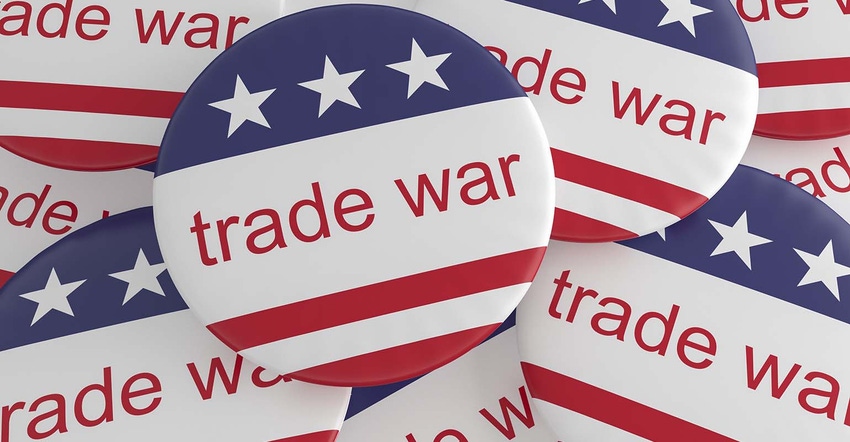
By Mario Parker and Isis Almeida
The fortunes of two of the world’s largest agricultural commodity traders seem to have turned.
This time last year, Archer-Daniels-Midland Co. beat profit estimates while Bunge Ltd. posted a loss after being wrong footed on soybeans amid President Donald Trump’s trade war with China. Fast-forward to 2019: ADM’s bet that the tit-for-tat spat would end by mid-year flopped, while Bunge’s more conservative approach put the firm in a better position than its rival.
“We continue to prefer Bunge over ADM,” Vincent Andrews, an analyst at Morgan Stanley, said in a report. “We see more risk to the setup at ADM,” where earnings guidance is more dependent on factors including a resolution of the trade dispute between Washington and Beijing, he said.
Investors will find out this week just how well the rivals fared. But if Wall Street’s perception is any guide, Bunge might turn out to be better off. Morgan Stanley last week cut its second-quarter forecast for ADM’s earnings per share by 10% to 60 cents while keeping Bunge’s unchanged. Citigroup Inc. last month also downgraded ADM’s 2019 earnings expectations.
On average, analysts cut annual profit estimates for ADM by 6.2% in the past three months, while lifting Bunge by 1.8%. To be sure, the estimates show ADM with a wider gross margin in the next 12 months.
Bunge didn’t immediately respond to a message seeking comment. ADM declined to comment.
The lack of a resolution to the trade war isn’t the only factor impacting ADM’s fortunes. Floods across the U.S. Midwest and rainfall that delayed corn plantings by the most on record sent prices for the grain rallying. That’s further squeezing margins for the Chicago-based company’s ethanol business, already facing a potential spinoff or sale.
Ethanol producers have struggled to make money as companies boosted capacity betting on increased demand from China. With corn prices now rising, plants are starting to shut. Last week, Plymouth Energy said it was halting output at its corn-ethanol mill in Merrill, Iowa.
ADM’s stake in Wilmar International Ltd. could prove to be another headwind. While the company is still positive it will benefit from the spread of African swine fever in China, for now the deadly pig disease is hurting demand for soybeans and, in turn, margins at Wilmar, one of China’s top crushers.
With so many factors running against it, ADM has toned down its views on the timing of a trade-war resolution ahead of results on Aug. 1. Chief Financial Officer Ray Young stressed at the Kansas Fed Ag Symposium this month that the company was unclear on such timing. He also highlighted the importance of finding other uses for crops including boosting America’s biofuel usage.
“We feel pretty confident that we will get towards a trade deal -- the issue is when,” Young said. “And that’s the uncertainty right now in terms of how we are managing our business. With a trade deal we do believe China will buy significant quantities of U.S. agricultural products and also corn-based ethanol. Even with ASF, they will, as part of the deal, buy U.S. products.”
For now, Bunge’s conservative guidance is proving to be a plus. Its outlook wasn’t dependent on a resolution to the trade war and new Chief Executive Officer Greg Heckman seems to be delivering on promises to improve the business. Last week, the White Plains, New York, based company announced it was forming a joint venture with British oil major BP Plc for its sugar and ethanol industry, a move welcomed by investors.
“Bunge has removed a major headache from its balance sheet and reduced its exposure to this difficult business,” David Driscoll, an analyst at Citigroup, said after the deal was announced. “Bunge is making clear progress with its debt-reduction goal, which will continue to move Bunge in a better position to compete in a volatile agricultural climate.”
Still, neither company is immune to the litany of ills plaguing agriculture and both have trailed this year’s 20% gain in the S&P 500 Index. Closely held rivals have already shown that times are tough. Cargill Inc. said last week that headwinds to its operations and a slowdown in earnings was forcing it to review plans, while Louis Dreyfus Co. recently reshuffled some of its top traders.
“We see an incrementally challenging second-half of 2019 environment for corn processing and U.S. grain origination,” said Morgan Stanley’s Andrews. “This will beg the question as to whether 2019 will be yet another year where ag’s operating conditions offset the full realization of restructuring related savings.”
--With assistance from Joe Carroll.
To contact the reporters on this story:
Mario Parker in Chicago at [email protected];
Isis Almeida in Chicago at [email protected]
To contact the editors responsible for this story:
James Attwood at [email protected]
Isis Almeida
© 2019 Bloomberg L.P.
About the Author(s)
You May Also Like




